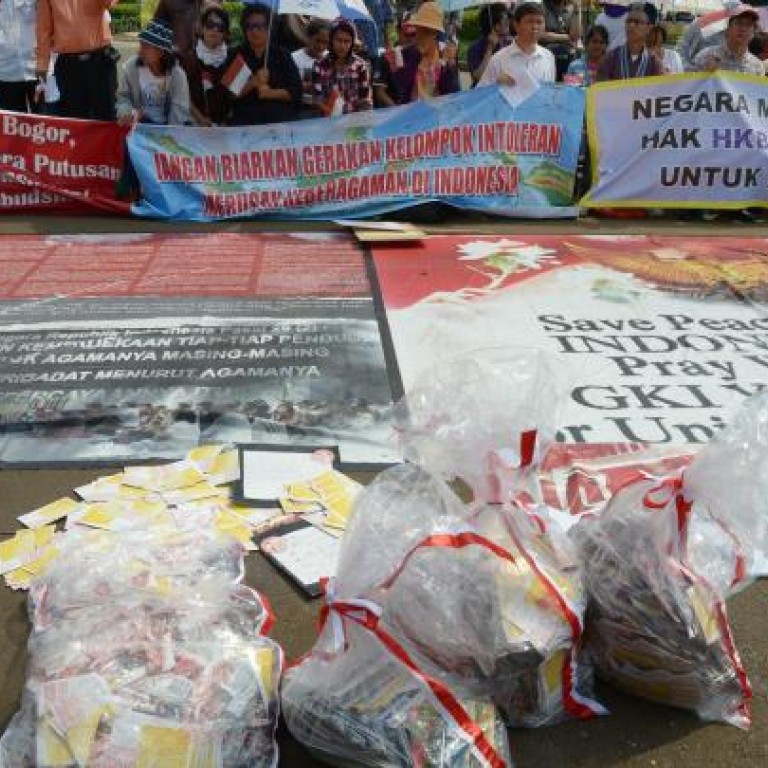
Indonesian church faces troubled Christmas
Persecution of religious minorities is on the rise in biggest Muslim-majority nation, rights monitor says, as Christians face violence
A Christian community in Indonesia, the world's biggest Muslim-majority nation, is preparing to hold Christmas services on the street as sectarian attacks keep them locked out of their church.
The Filadelfia Batak Christian Protestant Church has since 2009 held Sunday services under the blaring sun as Muslim hardliners and community members physically block them from their property.
The weekly intimidation in Bekasi, on the outskirts of Jakarta, has often erupted in violence - in May a mob of about 300 people hurled bags of urine, rotten eggs and stones at worshippers marking the ascension of Christ.
Such cases of religious intolerance are on the rise in Indonesia, according to the Jakarta-based civil-rights group Setara Institute for Democracy and Peace, which recently released a study recording 308 incidents in the first half of 2012 against religious minorities. Incidents including attacks and forced closure of places of worship have risen steadily since 2009, when 491 cases were reported, rising to 502 in 2010 and 543 in 2011, the group said.
This year has been particularly rough for Christians, who have seen dozens of churches sealed, particularly in the Islamic stronghold of Aceh province, where partial sharia law is enforced.
"Every Sunday I see people in my congregation cry. But we aren't scared - the ones who should be afraid are the intolerant, including the government and the police," Filadelfia leader Reverend Palti Panjaitan said.
"Indonesia is supposed to have a secular government. This is not an Islamic country, so just like Muslims have the right to pray in their mosque, we too have the right to pray in our church."
Panjaitan said his congregation would march to their church on Christmas Day, even though police had warned them to stay away, worried another protest would end in violence.
If they are barred from entering, they will set up as usual on the street, he added.
Religious minorities and rights groups have criticised the government for inaction on sectarian attacks, calling for legal protection and a revision of what they say is discriminatory law.
Under a 2006 ministerial decree, houses of worship must have the approval of the heads of at least 60 households of other religions, and much of the authority rests with the Interfaith Harmony Forum, perceived as favouring mainstream Islam.
But according to the Filadelfia church leaders, their proposal garnered enough support from the community to help them win a Supreme Court challenge to the legality of their church.
On a recent Sunday, members of the church joined other Christians in prayers outside the presidential palace in Jakarta and delivered to President Susilo Bambang Yudhoyono sacks of 7,000 Christmas cards from supporters. Most cards had come from the Bekasi community, and one sack was full of cards from as far as the Netherlands.
But those against the church say they were angered that they were not consulted before the land was purchased and that they disapproved of Christian activities in their neighbourhood.
"We're not saying the Christians can't pray. They can, but not here," said Aseng Sobari, who takes part in the protests.
The Filadelfia church was established in 2000 by a community of Bataks, a mostly Christian ethnic group hailing from northern Sumatra. The congregation has faced opposition since 2007 when it bought land for their place for worship.
December 25 has since become not only a day to mark the birth of Christ, but also a day to remember when their troubles began - the first time they were stopped from entering their church was on Christmas Day in 2009. Prayers have been held on the street ever since.
"My three children often come to the prayer services, and they too have had stones and urine thrown at them. We are tired of this and hope the president and other leaders take action," said church member Binarsen Sinaga, 49. "Indonesia is supposed to be a free country, but it doesn't feel that way, especially at Christmas."
